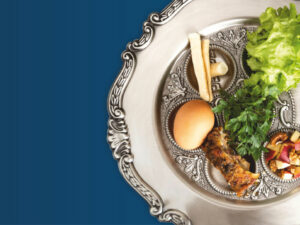As Shavuos nears, one word that keeps popping up in conversations, advertisements and even office discussions is cheesecake. Yes, the creamy delight that excites young and old alike is often looked upon as almost the apex of Shavuos itself. After all, Shavuos without cheesecake is like chicken soup without a matzah ball – it works, but all the fun’s been taken out of it.
Now, of course, cheesecake (or any other dairy food) is indeed a real part of the Yom Tov. After all, the minhag to eat dairy is mentioned in all of the poskim, and many reasons are brought for it, all of which tie in with the chag itself. So we are not here to minimize the relationship between cheesecake and Shavuos – or to remove the treat from anyone’s Yom Tov plate. However, while the minhag is a real one, it is in no way a major part of the day, and surely not the pinnacle of the festivities.
Shavuos, after all, is a celebration of our receiving the Torah, through which we receive every manner of blessing for all eternity. Through our study of every word contained therein and our incorporating its practical laws and lessons in our daily lives, we attain joy, happiness and eternal reward. “Lo nosato Hashem…lego’ei ha’aratzos… vegam bimenuchaso lo yishkenu areilim,” we recite every Shabbos in the Amidah. We alone have been bequeathed this gift, and we alone reap its rewards. Any other festivity that we engage in over Shavuos – be it culinary, camaraderie or repose – is but a means of celebrating its essential aspect, which is Matan Torah itself.
So while cheesecake is a part of our celebration, it is not, as a casual observer may be forgiven for assuming, what we are celebrating.
Let no one think, however, that cheesecake is the worst offender. To a casual observer, especially one with no awareness whatsoever of Torah or any of its laws, various aspects of other days on the Jewish calendar may be even more misunderstood.
This writer has often wondered what Pesach must look like to the casual non-Jewish observer living in proximity of a frum neighborhood. “Isn’t Passover something about slavery in Egypt?” an outsider might ask his friend.
“Something like that, I think,” his friend would reply. “Why?”
“Because I thought Passover was coming up soon, but it seems like the Jews are celebrating some sort of garbage holiday.”
“A what? What kind of holiday did you say?”
“Dunno. But it seems like some religious ritual having to do with throwing out garbage.”
“You’re kidding me, right?
“Not at all. At first I thought maybe it was just like spring cleaning, but my friends over at the sanitation tell me it’s for a religious holiday. They have special added garbage pickups, and even drop off centers where thousands of religious Jews pull up and bring their garbage. When a garbage truck comes down the block, men, ladies and kids literally run after it, throwing in whatever bags and boxes they seem to have available.”
“Wow. You think maybe it’s like a Jewish Save the Earth Day? Sort of like reuse, recycle, return to nature what you took from her?”
“Beats me. But I’ve sure never seen a holiday like it. I mean, I saw some fellows washing their garbage bins clean! Imagine that! Maybe it’s a sign of respect for the garbage bins for the role they play in the cycle of life.”
• • • •
In all seriousness, to someone with no idea about chometz, about biur chometz, about having to make certain that not a bit of chometz remains in our possessions come the zeman biur on Erev Pesach, the amount of garbage we dispose of, and the intensity with which we engage in the activity, must be a hysterical sight.
Or how about the Nine Days? Imagine two workers at your local Wal-Mart, Target or any other such store in the days preceding the Nine Days.
“Hey, Heather, do you have any idea what kind of Jewish holiday is coming up?”
“No, Lisa. Why?”
“Because one of the Jewish customers was so upset that we were all out of socks. She practically begged me to check inventory again and again. I told her I had no idea why all the socks were totally cleaned out of our entire store and that we should be getting a delivery on Wednesday. She said that’s too late, that it’s a sort of religious thing and she needs the socks before then.”
“Is that what it is? I was wondering why all of a sudden, all the religious Jewish customers were buying socks like they suddenly grew hundreds of new feet! And it’s not just socks either. Did you see the other aisles? There is not an undershirt left on the shelves. What do you think it can be? What kind of holiday is celebrated specifically with new socks and underwear? It’s not like they’re even buying dressy tops or other clothing. Only the socks and underwear. You sure she said it’s a religious thing?”
Even as our store associates are conversing, they see a frum woman standing in the sock aisle frantically speaking into her cellphone. “Chavi? I don’t know what to do. There’s not a sock left in the store. No, I checked there already. This is my fifth store. I know I shouldn’t have waited for the last minute, but what am I supposed to do now? I don’t have nearly enough socks for Moishy or for Mendy. I know, I know, but Rabbi Klein said that it would really be preferable for us to get new socks. Listen, if you hear of any place that still has socks in stock, call me A-sap, okay? Thanks a mill.”
Hanging up and seeing the two associates, the woman makes a beeline for them. “Do you have any socks that aren’t on the shelves?” she asks them.
They apologetically tell her no, the woman walks off, and the two associates look at each other and shrug.
“Wow. The rabbi’s telling them to buy the socks,” says one. “Never heard of this one. That I can tell you.”
• • • •
Again, with no understanding of the fact that we had a Bais Hamikdosh for which we are in mourning, and that one sign of our mourning is that we do not (in most cases, as per halacha) wash our laundry, which would bring with it the good feeling of having clean and freshly-laundered clothes (and we therefore need a nine-day supply of socks), the Nine Days, to an outsider, must seem like the strangest sort of “sock holiday.”
Yom Kippur, on the other hand, moves up from the socks to slippers. In shoe stores throughout or near the frum neighborhoods, there is a sudden rush on slippers, Crocs, sneakers, and anything “without leather.”
Poor Bob, working the shoe department in the local department store, is overwhelmed by the sudden demand he doesn’t even fully understand.
“You have no more Crocs?” he’s asked by a frum customer.
“Sorry. Sold out. We were fully stocked earlier in the week, but everything’s suddenly gone. Not a Croc left.”
“How about beach slippers? You know, the foam type. Do you have any of those?”
Bob checks and returns scratching his head and holding one pair. “This size 18, men’s, is the last pair we got. Dunno where they all went.”
“Size eighteen?! That’s like ten sizes too big. You think I can cut it down? I mean, I need some sort of slipper or something.”
“Well, we’re getting more on Monday.”
“Oh, that’s too late. You see, I need them for our holiday this Saturday.”
“Sorry,” Bob says as three more frum customers walk in, all heading for the slipper aisle.
“Oh my gosh! They’re out of crocs! They’re out of everything! What are we going to do?” one girl cries to her companions.
Bob holds up the size 18 beach sandals. “I don’t imagine this would help you any?” he ventures.
The girls shake their heads sadly. “You have no slippers at all?” one asks.
“Oh, we have lots of really nice women’s and girl’s slippers over in aisle 4,” Bob offers helpfully, knowing from experience that this won’t help, though he can’t understand why.
Sure enough, the girls again shake their heads in regret. “No, those won’t do. Those are real slippers, you know, like leather. We need like Croc or plastic or like foam,” one girl ends hopefully.
Bob reiterates that they’re all out. The girls leave and he’s left as puzzled as ever. Aren’t the Jewish High Holidays around now? he wonders. He’s heard something about an apple in honey, maybe even a ram’s horn. But slippers? What kind of holiday is that?
• • • •
We can go on and on, but the reader surely has the idea by now. When judged by some of the surface items, the superficial manifestations of some of the times in the Jewish calendar, we can definitely find things to chuckle, or even laugh, about. After all, socks? Slippers? Garbage? What kind of holidays are those?
We, however, understand that those items are merely what people on the outside might see, but they are nothing more than aspects resulting from various religious practices which, understood in depth, are truly meaningful and inspirational.
Preparing for Pesach may result in lots of garbage, but it is far more an exercise in understanding that chometz – as in the excesses, the hot air and the procrastination of man – is not good for us, no matter how exciting or enjoyable these may seem at the moment. Doing without our regular footwear on Yom Kippur is similarly an act resulting from, and bringing us to, the inuy of that holy day when we give up some of our normal comforts as we beg Hashem for His forgiveness for our excesses and wrongdoing.
It’s the same with every Yom Tov or other period in the Jewish calendar or in Jewish life. Rachmana liba ba’i. Hashem desires our hearts (Sanhedrin 106b). It’s not a matter of who has a nicer esrog or a more mehudardige pair of tefillin, but rather who was so excited for the mitzvah that his excitement brought him to truly want something special for the mitzvah.
While we might laugh at how an outsider might so misinterpret any one of our religious practices, what would be terrible is if we would forget what we’re really doing and merely focus on the externals as well. Imagine if we thought that Shavuos was nothing more than good cheesecake and we’d forget all about how the day is a celebration of everything good in Klal Yisroel that results from our being given the wonderful Torah. The flowers, the cheesecake, the staying up all night are all but aspects of the celebration of Matan Torah.
This is a lesson that we can take far past Shavuos.
How many people think of tznius as a bunch of rules regarding inches and thicknesses? While one aspect of tznius will indeed manifest itself in how we dress, which may reflect in certain thicknesses or inches, those are merely by-products of a far more important middah. Showing off – whether the kind of simchos we make, the lifestyle upgrades we can afford, or even the chumros we maintain – is far from tzniusdik. Behaving in ways that bring undue public attention to ourselves – yes, even if it is summer and everyone does it – is a total lack of tznius even if we are covered from hair to toe.
With regard to Shabbos, our special Shabbos clothing and all the delectable Shabbos foods are a sign and in honor of this most special day when Hashem rested and we thus rest from performing melacha as well. To define one’s Shabbos by what to wear (or what others wore) and what to serve (or what others served), while simultaneously remaining unaware or uneducated about the many and varied aspects of borer, melabein, amira l’akum, etc., is to act as if Yom Kippur is all about our footwear and little more. To dress in one’s finest while taking melachos such as hotza’ah lightly is to eat the cheesecake while forgetting about the Torah.
Jewish music, too, is about bringing one closer to Hashem by means of the awesome power of neginah, song. This koach was harnessed in the Bais Hamikdosh and can still be harnessed by us today. The pesukim, or other Hebrew words we might sing, are often an aspect of the effect of any given song. If one were to take Hebrew words – even the holiest words in our Torah – and sing or arrange them in a manner that brings one to levity, lack of restraint, wildness or boorish behavior, it’s as if he celebrates Pesach with garbage. Lacking any deeper meaning or inspiration, he is left with a celebration centered on garbage and little else.
• • • •
As we dig into our cheesecake or another milchige delight, we should definitely enjoy it even as we associate this enjoyment with the true excitement of the chag. We should savor as well the lesson that our Torah is so deep and so rich, to a far greater extent than the mere surface pleasures and practices. When we focus on why we do so many of the things we do, we will have gained for ourselves a far more meaningful, richer and exciting life.








